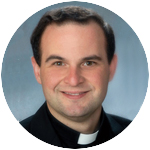
Father Eric J. Banecker
For the vast majority of us, we hope, the effects of covid-19 will not require medical intervention. Of course, that is not in any way to discount the many people who have gotten sick and will continue to do so. Thousands of people have already died as a result of this virus, and there are surely more to come.
Yet the effects for most of us are indirect, measured by investment accounts, inconveniences, disruption of our normal schedules, and the scarcity of simple joys like watching a baseball game.
And yet, for those who survive this pandemic, the question will be: how do we move on from here? Specifically, what new patterns of life can we put into place now — during “lockdown phase” — which will benefit ourselves and the institutions around us?
[hotblock]
There have been some strange positive side-effects of Quarantine 2020. Highways are clear of traffic. Smog has lifted from major cities like Los Angeles. We’ve suddenly found free time we didn’t realize we were permitted to have, to do things like read, pray, catch up with old friends. I suspect I’ve had more deep, extended conversations in the last month than I had in the previous 12 months combined.
Don’t get me wrong: I miss being able to move about freely and miss seeing parishioners in person and not on a screen. And of course, the problems with domestic life which have suddenly been revealed to us are in some ways more deadly than covid.
Without places for people to escape, domestic violence, addiction, child abuse and depression become greater strains on people’s lives. Awkward and troubled family situations have been exacerbated. The church must find concrete ways of addressing these issues when all this is over, as well as the economic loss which will be felt for years to come.
The church, of course, has the answer to all these problems, not in policy recommendations but in her proclamation of the death and resurrection of Jesus Christ. He is the answer to our fears and anxieties. His death is God’s response to our sinfulness. In his rising, we are given sure hope which does not disappoint.
These days have given Catholics a sudden opportunity to renew and refresh certain aspects of our life. Priests have the chance to focus on our interior lives, to be renewed in our identity, which can often take a backseat to busy schedules. Important devotions like eucharistic adoration, prayerful meditation on Scripture, and the rosary (especially within families!) have all risen to the forefront of our spiritual lives in the absence of public Mass.
The church’s engagement with digital media has taken several major steps forward in the past month as well, which is a very good thing. All this will serve us well as we seek to help bind the physical and spiritual wounds that people are more acutely aware of.
Many people – myself included – get anxious about returning to “the way things were.” But the fact is, that’s not an option. And by the time we call the covid-19 epidemic completed, new practices will have become a “new normal.”
Yes, this is unsettling in the short term. But it’s also very exciting if the result is a more equitable society, a simpler kind of lifestyle and a church renewed in her dynamic proclamation of the Good News.
In these days of Easter, now is the time for joy and hope, for prayer and discernment, because once the doors open, the age of renewal will have begun.
PREVIOUS: Prom and high school commencement are out, but mercy remains
NEXT: In fight for our environment, make room for mourning



Share this story